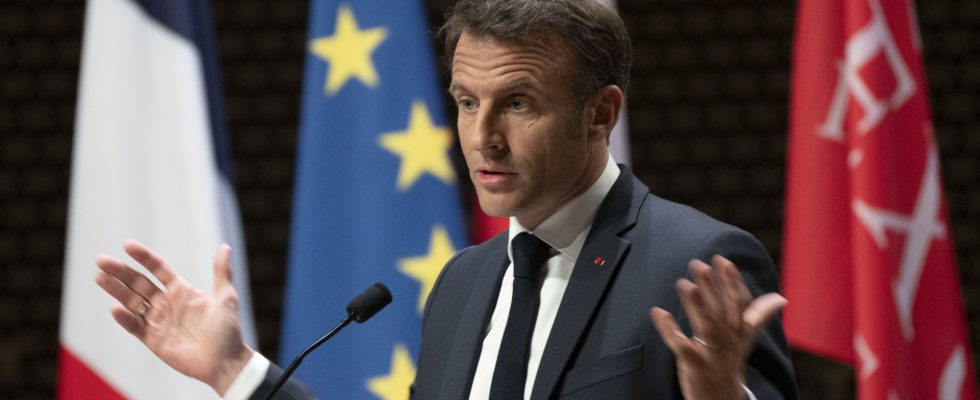Status: 04/11/2023 8:02 p.m
The French President’s comments on Europe’s role in the China-Taiwan conflict have drawn much criticism. In a keynote speech in The Hague, Macron reaffirmed his vision of a sovereign continent.
Emmanuel Macron does not address the Taiwan conflict in The Hague. But the French President is sticking to his call for more European sovereignty in his keynote speech on the occasion of the state visit to the Netherlands.
Without naming a country, Macron emphasizes: “Standing up for sovereignty does not mean turning away our allies. It means that we have to be able to choose our partners and shape our own destiny instead of – I would say – just witnesses of the dramatic development of this world.”
Countermeasures to protect European interests
In Macron’s view, Europe’s dependence on other countries has become particularly clear during the corona pandemic and the Russian war against Ukraine. He wants to take countermeasures: through a coordinated state-controlled industrial policy and self-confident protection of European interests.
For example, the EU should not conclude any trade agreements with countries that do not meet the same standards. In an interview given by the President to several media outlets on the return flight from the three-day state visit to China, Macron went further. In it he warns Europe against falling into crises that do not concern it.
Referring to Taiwan, Macron said the worst thing would be if the Europeans, as followers, had to adapt to the American rhythm and a Chinese overreaction. The People’s Republic of China claims the democratically governed Taiwan as its own.
EPP leader: “Democrats must stand together”
The EU Commission did not want to evaluate Macron’s statements. Her spokesman Eric Mamer referred to the principles of Brussels’ China policy: “One consequence of this policy is that we have of course demanded and continue to demand peace and stability in the Taiwan Strait and that we resolutely oppose any unilateral change in the status quo , particularly through the use of force.”
Foreign politicians in Berlin and Brussels became clearer: the chairman of the Christian Democratic EPP group in the EU Parliament, Manfred Weber, emphasized on Twitter that democrats must stand together to defend a rule-based world – in Ukraine and in Taiwan.
Criticism from the Greens to the CDU
Green MEP Reinhard Bütikofer called Macron’s visit to Beijing a disaster. Bütikofer calls for opposition to unilateral changes in the Taiwan Strait.
The Christian Democrat Norbert Röttgen declared in Deutschlandfunkif you signal to men like Xi Jinping and Vladimir Putin that their aggression has nothing to do with Europe, conflicts would become more likely: “Macron is isolating himself in Europe, he’s weakening the European Union and he’s thwarting what the President of the European Commission said in Beijing has.”
Distance to Washington and Brussels
With his statements, the French President is distancing himself from Washington, which has sharply condemned Beijing’s threats towards Taiwan – and Macron is doing so at the very time when China is holding military maneuvers off the coast of Taiwan and practicing the blockade of the island.
Macron also cannot claim to speak on behalf of Europe. In any case, he sets clearly different accents than EU Commission chief Ursula von der Leyen – that became very clear when the two visited Beijing last week.
Alstom and L’Oréal signed contracts
Von der Leyen warned China’s government more clearly than Macron against arms deliveries to Russia in the war against Ukraine and also against a possible attack on Taiwan. In a keynote speech a week and a half ago, von der Leyen announced a much tougher course towards China.
For the French head of state, the focus in Beijing was on expanding economic relations. He was accompanied by a large business delegation. French companies such as EDF, Alstom and L’Oréal signed contracts.
Macron’s favorite topic: European sovereignty
Europe’s sovereignty has been the French President’s favorite topic since he took office six years ago. In the widely acclaimed speech at the Sorbonne in Paris in September 2017, Macron called for more autonomy in economic policy and a common European defense, independent of the major partner, the United States.
In his speech in The Hague, Macron explicitly referred to his Sorbonne speech: “At the time, many considered the demand for European sovereignty to be French wishful thinking.”
Alienation between USA and France
In 2019, Macron criticized the lack of coordination between the US and its NATO partners in strategic decisions and certified the alliance as “brain dead”.
Relations between Paris and Washington cooled further in September 2021 when the United States, Britain and Australia formed the Aukus security alliance to counter China’s expansionist drive in the Indo-Pacific. The contract for the sale of twelve French submarines to Australia fell through. The discord has since died down.
What is Germany doing?
The federal government is still working on its China strategy. It will play a role in the fact that Chancellor Olaf Scholz fundamentally considers the image of a bipolar world in which only the United States and China face each other as superpowers to be outdated.
Scholz has spoken out in favor of expanding trade with Asian countries and not becoming dependent on China. During his Beijing visit last November, Scholz did not omit the Taiwan conflict and warned against violent changes to the status quo.
Scholz also mentioned the human rights situation in Chinese provinces. However, the Chancellor’s visit also drew a lot of criticism and was seen as a German solo effort at an unfortunate time – shortly after head of state and party leader Xi had secured a third term at the CP party congress.
From Beijing to The Hague: Macron’s call for European sovereignty
Jakob Mayr, ARD Brussels, April 11, 2023 6:22 p.m

